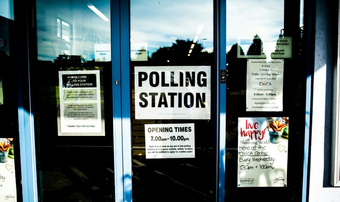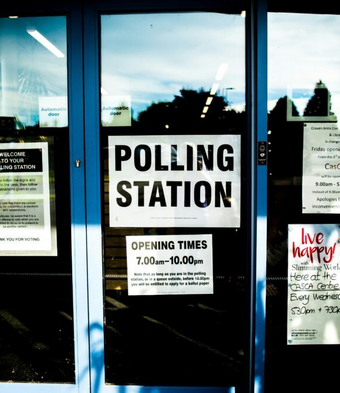Starmer needs to offer a vision
The holidays are over marking the end of summer and any honeymoon period for Keir Starmer. This week the Prime Minister gave a significant speech in the Downing Street Rose Garden to an invited group of the public whom he had met during the general election campaign. Reported as a ‘gloomy’ speech full of bad news, the opposition has claimed that the speech was performative politics; an attempt to define the last fourteen years and set the narrative for the next five. Another viewpoint is that it was a return to honesty - a reality check about how bad a state we are in. Starmer the prophet perhaps?
There are elements of truth in both interpretations, but only elements. Reflecting on his speech over the last few days I believe that those familiar with God’s word are equipped to critique and suggest what the Prime Minister needs to add to his analysis in the months ahead.
But first it is worth noting what the Prime Minister did say.
We were reminded of some familiar lines from the Chancellor earlier in the summer. The £22billion black hole in public finances meant tough public spending choices have to be made – explaining the decision over winter fuel payments and, I expect, more cuts and possible tax rises in the autumn.
However, the speech was not just about public finances. In a significant section the Prime Minister stated that there was "not just an economic black hole but a societal black hole" left by the previous Conservative government. This could be seen in the riots earlier this month where the Prime Minister claimed that many rioters calculated that they would get away with the violence because the police, courts, and prisons were ins such a bad way they would not be found, prosecuted, or imprisoned. This is an interesting analysis of both the riots and state of society.
As he leaned into this theme the Prime Minster drew a contrast between the rioters and those who came out to clear up the streets and rebuild their communities after the violence. We can all agree with him that we want a country defined by the community builders not community breakers, and the part the church plays in social cohesion and holding communities together through sacrificial service.
Starmer values the role churches can play
Many – but by no means all – of the positive role models Keir Starmer celebrates will be Christians, who are quietly at work in their community acting as reconcilers and peacemakers; getting stuck in and seeking the welfare of their town or neighbourhood.
These are not just fair weather ‘good eggs’. Christians and churches are among those who step up when it was most risky, costly and needed. One friend, a vicar, whose leads a church in a northern city, was contacted during the week of riots and asked if he could help immigrants who had to evacuate their temporary accommodation because it, and they, were under threat of attack. The church opened its doors as a safe refuge, and as a hospitable generous host. Meals were cooked, a safe place to stay was provided. Just as important, the church also embraced the group of scared, worried, traumatised people with dignity and love – Christians treated their neighbours as those dearly loved and bearing the image of our Creator.
This is a role the church plays ‘off camera’ that I know the Prime Minister respects and values. The relationship between the church, including evangelicals, and the government now are a world away from how the Labour Party’s previous leadership saw Christians, especially those who hold biblically orthodox views and the authority of God’s word.
In June Keir Starmer, as leader of the opposition, wrote to faith leaders and organisations (including CARE), stating faith groups, communities and people of faith, “have saved lives, sustained families and strengthened communities in their hour of need. You have demonstrated what it means to be a society of service and we are forever grateful. We recognise the depths of belief and devotion that drive your commitment to social justice and social action. And we welcome your efforts to bring about a brighter future for everyone in our country.”
In many respects this was an example of the “change” Keir Starmer was promising in his campaign. It reflects the progress made, but also a ‘gap’ that will probably always exist between followers of Jesus and the government. And I would suggest this also points to a gap in the analysis and the solution that the current government may be pursuing.
At its core most governments (Labour, Conservative and coalition) see the transactional value of the church and other religious groups and faith communities. We do lots of good work without fanfare, or demanding too much, and we do it ‘cheaply’ – that is to say we do not cost the Exchequer much money.
Christians are, in most governments eyes generally, good citizens, as long as we stick to good works. And that’s where things become more challenging for the Prime Minister.
I believe the Prime Minister is a man of integrity, a sense of public service, and has values that will serve him and the nation well over the coming years. He also seems very competent and skilled in many areas of leadership that will be tested in the challenging years ahead.
Without a vision, the people perish
What I am still waiting to see and hear is a vision – where the analysis and solution goes beyond balancing the books and economic growth. In the King James Version of the scriptures, Proverbs 29:18 says 'where there is no vision, the people perish'. The bible teaches that good stewardship involves living within our means and passing our inheritance on in a better shape than we received it.
The bible also warns that economic growth should never be built on the intended or unintended exploitation of the vulnerable, and that we need to guard our own hearts against wealth causing us to be less generous, less hospitable, less compassionate, and more selfish, more worried about others taking it away, as we are tempted to believe that material wellbeing is the result of our won efforts not a good gift from the Lord.
And God’s good plan for us, what the bible defines as the good life, goes significantly further than economics. Being better off will not often change hard hearts – it will not make the rioters more compassionate towards the many who flee danger as well as hardship and seek to make a contribution to this country as well as a home. Many of our deep-seated social problems will not be resolved simply with money, just as many of the issues facing public services will not be resolved by more funding.
God’s word provides a far deeper analysis and far greater and ambitious vision for a good society than most of us – including our politicians – can comprehend.
Presenting biblical insights like these, evidenced and presented graciously, humbly and compassionately how we at CARE, and you our partners and supporters, as well as the wider church, can help the government.
Christians getting out and sweeping the streets and mending the damage is important. Churches opening their doors to be a safe refuge and an extended family to the vulnerable and those in need is authentic Christianity.
But we also have a story to share that is prophetic and hopeful – that understands the depth of brokenness and power of sin, but knows that there is light, hope, and a power that overcomes the darkness. It is a story and promise of redemption and full restoration in the future, but also of hope and redemptive acts now. It seems that this and every government needs this story to help understand and find solutions to our biggest challenges.
Israel in Babylon sat down and wept, but they also sang, built homes, got married, planted crops. We can do the same. We lament, but do not stay weeping. We get up and sing a song to ourselves, and to the rioter and Prime Minister alike. A song that can bring real change to individual and nation.






